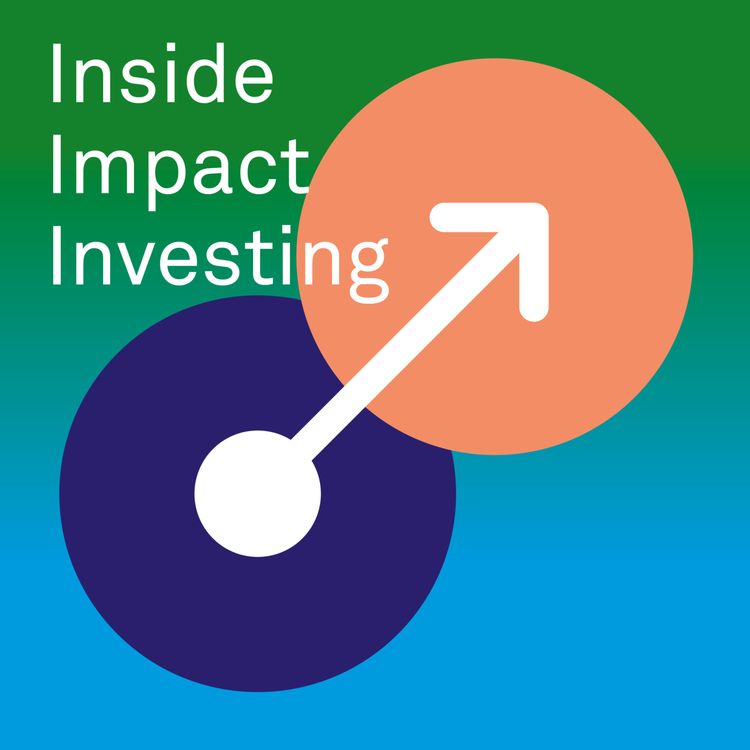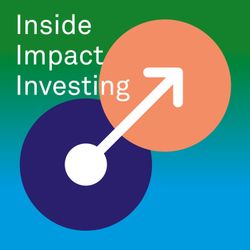Share

Inside Impact Investing
Reset the economy Part II: William Burckart - The changed investment environment
COVID-19 and the subsequent social and economic crises have underlined once more that we must urgently address the severe shortcomings in our present-day economies and societies. We must intensify our efforts to combat climate change, loss of biodiversity, and rising inequality, and build an economy that is fit for the future: one that is more resilient, more sustainable, and more inclusive.
Investors play a crucial role in the transition to this new economy, providing the capital needed to realise real and profound change. The investment choices they make can have a positive impact on our planet and on society, and at the same time safeguard their chances of solid long-term investment returns.
In a series of articles and podcasts Hans Stegeman, Chief Investment Strategist at Triodos Investment Management, explores the contours of a future-proof economy, and the ways to get there.
In this second episode, Hans Stegeman and William Burckart, President and COO of The Investment Integration Project and co-author of the book 21st Century Investing, discuss a new approach to investing to drive systemic change:
- Choosing the right transitions; a forward-looking approach in making investment decisions
- Impact first; contributing to positive change and thus mitigating risks, instead of the other way around
- The best asset classes to make impact.
More episodes
View all episodes

7. Nicky van Dijk and Sven Renon - What's left of the climate commitments of the financial sector?
26:39||Season 5, Ep. 7In this episode, Karel Nierop assesses how financial institutions are progressing on their emissions reduction targets with Nicky van Dijk, Lead Researcher for the Climate Court Case against ING at the Dutch NGO Milieudefensie, and Sven Renon, Sustainability Researcher at Triodos Bank.Following the ESG-backlash, financial institutions have abandoned their voluntary climate commitments en masse. Triodos Bank recently also revised its climate strategy and no longer claims to be net zero in 2035. The bank also left the Net Zero Banking Alliance. So where do we stand? Is the financial sector still on track to reach the goals set by the Paris Climate Agreement? Has Triodos given up on climate? Or has the time come for more rigorous action?This is a follow up from the podcast on bank’s climate commitments we recorded in 2024: https://open.spotify.com/episode/0jawpf3a08cuEuyTZK5YFh?si=0pJHIMdXT72SVNRzUF-Glw Learn more about Scope 3 emissions here: What are Scope 3 emissions and why do they matter? | The Carbon Trust
6. Joop Hessels and Jeroen van Herwaarden - Does the EU Green Bond Standard deliver on its promise?
24:57||Season 5, Ep. 6In this episode, Rosl Veltmeijer discusses first experiences applying the EU Green Bond Standard in practice with Joop Hessels, Executive Director and Head of Sustainable Markets at ABN-Amro and Jeroen van Herwaarden, fund manager of the Triodos Euro Bond Impact Fund.The EU Green Bond Standard is a new standard for use-of-proceeds bonds. Like any other bond label, it is a voluntary standard introduced by the European Commission as part of the broader EU Action Plan. Launched in December 2024 with the purpose of stimulating green investments, it has been tested for almost a year now. A good moment to evaluate how it works in practice with two specialists. Joop Hessels looks at the EU GBS from an issuer perspective whereas Jeroen van Herwaarden approaches the topic from the investor angle. This episode is a follow-up on a previous podcast we did on the EU Taxonomy and the EU Green Bond Standard: https://open.spotify.com/episode/4lOww9NohwzUmIN9wH2faS?si=yKCkdUL3Qv-kkNIXKGt5bw
5. Matt Goodwin and Sjoerd Rozing - How investors can contribute to the online safety of children
21:11||Season 5, Ep. 5In this episode, Rosl Veltmeijer sits down with Matt Goodwin, Head of Sustainable Investing at the Global Child Forum, and Sjoerd Rozing, portfolio manager Future Generations at Triodos Investment Management, to explore the concept of Child Lens Investing from the perspective of online safety for children. Children are our future - future consumers, workers, innovators and caregivers. Yet, despite their significance, their interests are often overlooked in economic and financial decision-making. Investors play a crucial role in shaping the world that future generations will inherit. By applying a child lens to investing, they can move beyond short-term returns and focus on building a sustainable, inclusive and thriving global economy.Read more about the concept of Child Lens Investing in this handbook: Investor Handbook Child-Lens InvestingMore about Global Child Forum can be found on their website: globalchildforum.org
4. David Kuijper and Judith Santbergen - Understanding the impact potential of blended finance
31:38||Season 5, Ep. 4In this episode, Karel Nierop explores the intriguing landscape of blended finance with David Kuijper, CEO of The Association of European Development Finance Institutions (EDFI) and Judith Santbergen, Fund Manager of the Hivos-Triodos Fonds, a blended finance instrument avant-la-lettre. Kuijper explains what blended finance entails and how it is needed to get important transitions going, especially in emerging markets. Santbergen elaborates on Hivos-Triodos Fonds' ability to do smaller transactions, focusing on SMEs in high impact sectors in emerging markets. Tailored to meet investors’ requirements - be it fiduciary or regulatory - blended finance can open new markets and offer diversification. Despite the difficulties in scaling up, both guests see strong opportunities for blended finance. Given the demographic developments with Europe ageing and declining in population while the global south is young and growing, combined with Europe’s enormous amount of pension savings, there is an urgent need to transition European private capital to emerging markets. Blended finance facilities can help change the direction of private capital flows, for example in sectors where blended finance has proven to work like renewable energy and resilient infrastructure.
3. Kayoko Lyons and Tim Crijns - Investing in financial inclusion
24:34||Season 5, Ep. 3In this episode Karel Nierop sits down with Kayoko Lyons, Director of Investments at the Missionary Sisters of the Sacred Heart and Tim Crijns, Portfolio Manager Financial Inclusion at Triodos Investment Management to explore the world of financial inclusion. Tim explains how microfinance works, why the actual risks are often lower than perceived, and how local economies show strong resilience. Kayoko shares her investment journey, highlighting the crucial role of financial services in economic development and encouraging new investors to be bold, start small and do something. Together, they discuss future trends, the role of technology, and the importance of maintaining a strong impact mission. The episode closes with practical insights into how investors can contribute responsibly to expanding global financial access.More information about the Missionary Sisters of the Sacred Heart: Welcome to the Missionary Sisters of the Sacred Heart of Jesus | Bringing Christ's love to the worldMore information about the benefits of backing financial services in emerging markets: The benefits of backing financial services in emerging markets
2. Lewis Johnston and Joeri de Wilde - Could the ESG backlash kill sustainable investing?
28:26||Season 5, Ep. 2The geopolitical storm we are in has accelerated a development that was already visible for some years: a fierce backlash on ESG. In this podcast, Rosl Veltmeijer discusses the implications of this backlash with Lewis Johnston, director of policy at ShareAction and Triodos economist Joeri de Wilde. Together they analyse the events and circumstances that led to the ESG backlash and try to answer the question if we are witnessing a structural shift away from ESG investing or only a temporary setback.Read Joeri's column 'No shift away from sustainability' here: BlackRock never really had sustainable ambitions, more and more citizens doFind out more about the activities of ShareAction here: ShareAction | Harness the power of investment
1. David Diallo and Mareike Hussels - Investing in Nature-based Solutions
28:24||Season 5, Ep. 1In this episode, Karel Nierop discusses how we can make finance work for nature instead of against with David Diallo, founder of Berlin-based startup goodcarbon, and Mareike Hussels, product development manager for Nature-based Solutions at Triodos Investment Management. The term Nature-based Solutions pops up in the news more and more often but is also still a bit vague for most people. Triodos recently made a commitment to provide at least EUR 500 million in investments, loans and contributions to the Nature-based Solutions sector by the end of 2030 as part of its biodiversity targets. The IPCC ranks certain Nature-based Solutions among the most promising ways to tackle the climate crisis. But what are Nature-based Solutions exactly? Why is the IPCC so enthusiastic about them? And do they represent an interesting investment case? These are the questions that are addressed in this podcast.Read more about Triodos' commitment to the Nature-based Solutions sector here: Triodos Bank nature-based solutions commitmentMore about the partnership with goodcarbon can be found here: investment Hivos-Triodos Fonds: goodcarbon
7. Ronald Huisman and Kay van der Kooi - Is the energy transition becoming a victim of its own success?
26:47||Season 4, Ep. 7In this episode, Karel Nierop discusses the challenges and opportunities of an energy system under construction with Ronald Huisman, Professor for Sustainable Energy Finance at the Erasmus University in Rotterdam (amongst others), and Kay van der Kooi, Senior Investment Manager at Triodos Investment Management.The energy transition in Europe is in full swing. A main component is the electrification of many processes: from transport and heating to highly energy-intensive industrial processes. This means a large buildout of both generation and consumption of electricity. While the process of electrification is taking up speed, the energy system, which was designed with fossil fuels in mind, is squeaking and creaking. Examples include waiting lines for electricity connection in construction projects and negative energy prices during peak electricity production. Will the initial success now threaten to undermine the energy transition?Interested in learning more about this topic? Read Kay van der Kooi's blog on net congestion here: What’s the hold-up? On the Ins and Outs of Grid Congestion
6. Dirk Schoenmaker and William de Vries - Impact investing on public markets
32:17||Season 4, Ep. 6In this episode, Rosl Veltmeijer discusses how to achieve meaningful impact by investing in stock listed companies with Dirk Schoenmaker, Professor of Banking and Finance at Rotterdam School of Management (Erasmus University) and William de Vries, Director Impact Equities and Bonds at Triodos Investment Management.Impact investing is often associated with direct or private investing but is it also possible to invest with impact in public markets (stock listed investments)? And if so, how can this be realised? Dirk Schoenmaker explains that while financing the changemakers is important, it is essential to also finance established companies that are willing to transition in order to shift the system. William de Vries elaborates on the importance of engagement in achieving impact with listed companies. He also emphasises the added value of collaboration with like minded investors. Important takeaway of the discussion: not all impact can be quantified and attributed but the most important thing is that change actually happens.Interested to learn more about generating impact by investing is listed equities? Read this article